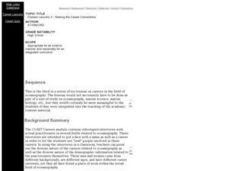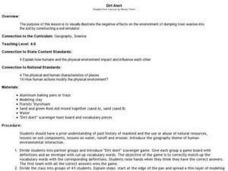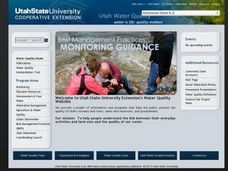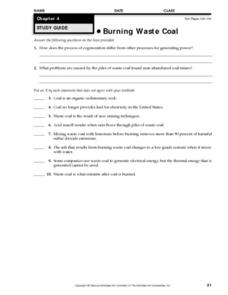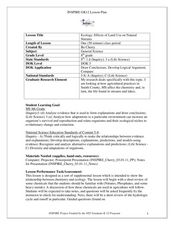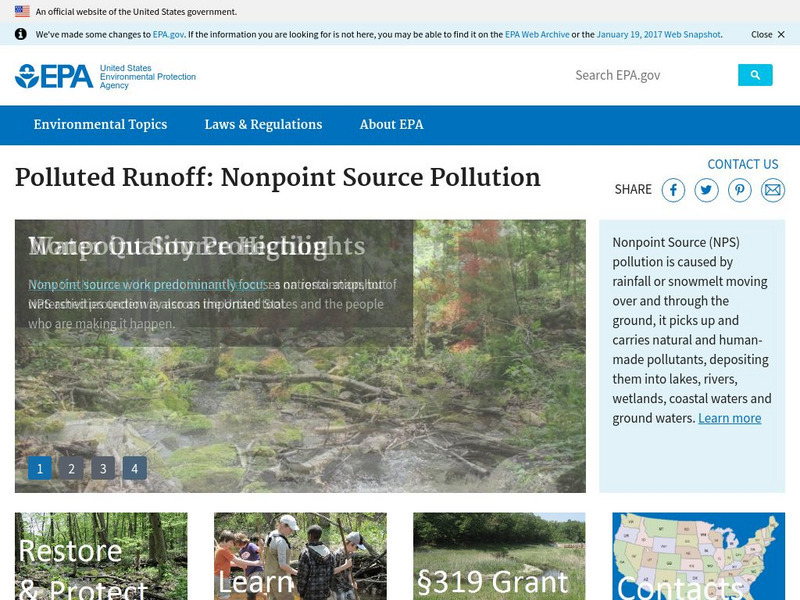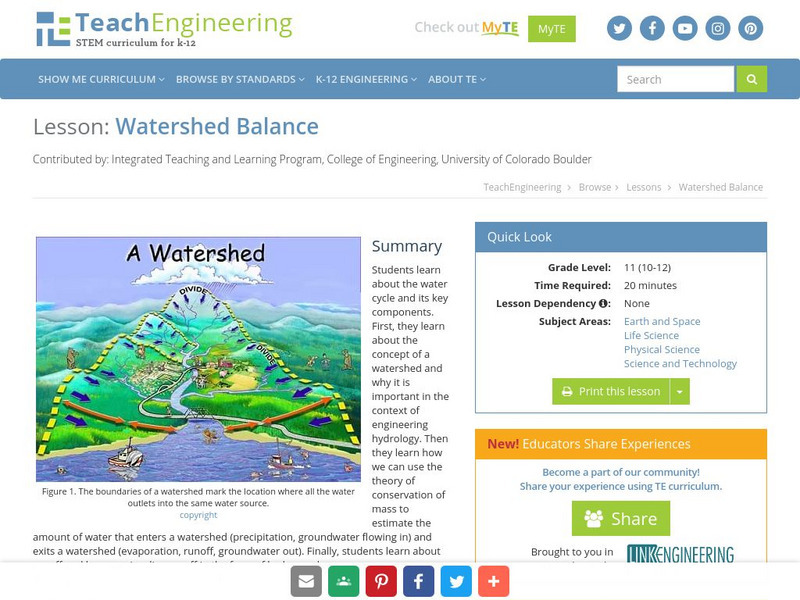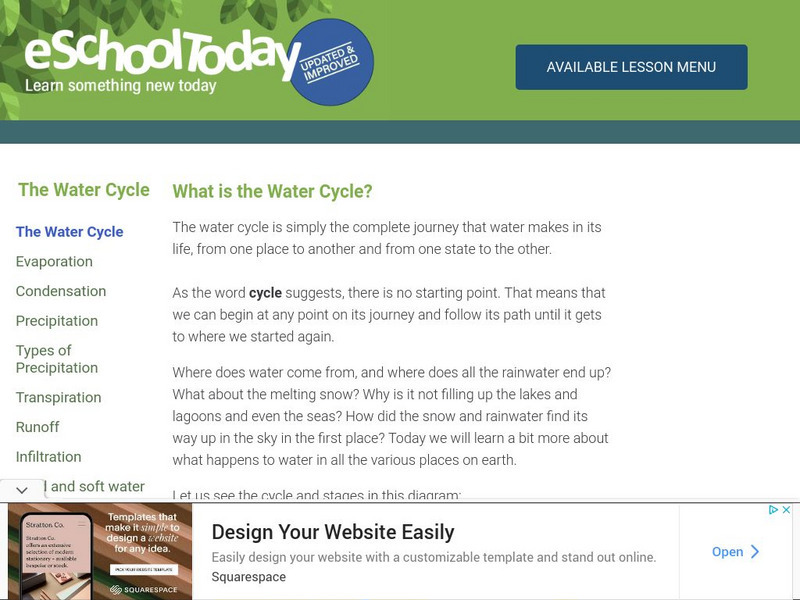Curated OER
Build A Model of the Water Cycle
Students identify and describe the steps in the water cycle. They discover the sun as the source of the cycle. They work together to create their own water cycle model.
Curated OER
Science: Making Career Connections
Students explore careers in oceanography. They compare and contrast requirements for careers in the field, and determine what high school courses would help to prepare them. Finally, they create a computer-based project related to...
Curated OER
Streamflow
High schoolers discuss the topic of streamflow and how it occurs. They take measurements and analyze them. They interpret data and create their own charts and graphs.
Curated OER
Dirt Alert
Students explore the environment and effects of pollution. They participate in a "Dirt Alert" scavenger game to study vocabulary words. Students construct a soil simulator to visually illustrate the negative effects on the environment of...
Curated OER
No magic borders
Students discuss what they have heard about pollution. They explore the purposes and limitations of political boundaries and borders and identify some of the causes and effects of pollution.
Curated OER
Coffee Plantations
Students explore coffee and coffee plantations. They view a Power Point presentation of what coffee looks like, where it grows, and how it is harvested. They discuss the environmental impacts on growing cofee and how it compares to...
Curated OER
Human Impact on Water Quality
Students identify at least three common repercussions of developing water front property on water quality. They describe three sources of water pollution. They research the organism striped bass and observe it if striped bass is available.
Curated OER
Riparian Review
Students engage in the process of researching a riparian ecosystem. They conduct a field trip in order to obtain different types of data and work on measurement skills to analyze data to form a conclusion about the biotic factors of the...
Curated OER
Parched! No Water, No Town
Students discuss the benefits of water conservation. Given a data sheet, they document their water usage over a specified period. Water usage data is graphed and analyzed. Students discuss ways in which they can conserve water.
Curated OER
Water Quality Monitoring
Learners comprehend the four parameters of water quality. They perform tests for salinity, dissolved oxygen, pH and clarity or turbidity. Students comprehend why scientists and environmental managers monitor water uality and aquatic...
Curated OER
Burning Waste Coal
In this coal worksheet, students compare the process of cogeneration with other process for generating power. Students determine what happens to the waste coal. This worksheet has 2 short answer and 8 true and false questions.
Curated OER
Effects of organic material and nutrient pollution
Students create a definition of eutrophication. In this organic material activity students work together to create a storyline.
Curated OER
Are You Thirsty: The Effects of Pollution on Drinking Water
Pupils discuss the different causes of water pollution. In this ecology lesson, students brainstorm ways to purify polluted water. They formulate their conclusion based on the results of the experiments.
Curated OER
Ecology: Effects of Land Use on Natural Streams
Eighth graders examine how humans affect various ecosystems. In this ecology lesson, 8th graders discuss different ways that contaminants enter the stream. They explain the consequences of eutrophication in lakes.
Curated OER
Hydrology: Flood Mitigation
Twelfth graders discuss the different factors that can contribute to major floods. In this ecology lesson, 12th graders analyze collected rainfall data. They complete a scavenger hunt after the lesson.
Curated OER
Hydrology: Flood Mitigation
Twelfth graders discuss the factors that affect flooding. In this environmental science lesson, 12th graders analyze rainfall data about flooding. They complete a scavenger hunt worksheet using the internet.
US Environmental Protection Agency
Epa: Wetlands and Runoff
This thorough resource examines how untreated runoff impacts wetlands, efforts by the EPA to educate landowners on how to protect wetlands, the use of wetlands to treat runoff, and current EPA programs that address runoff.
US Environmental Protection Agency
Epa: Polluted Runoff: Nonpoint Source (Nps) Pollution
EPA site offers answers to what nonpoint source pollution is as well as provides links and information as to what concerned citizens can do about it.
Science Education Resource Center at Carleton College
Serc: Mn Step: Water Runoff: How the Ground Water in Your Community Is Affected
After creating a model, students will investigate factors that affect water runoff both positively and negatively, and the impact this has on the quality of groundwater.
Texas Instruments
Texas Instruments: Jason: Land Erosion Running Off With Soil
Rainforests at the Crossroads: Examine the relationship between rainfall and runoff on Barro Colorado Island (BCI) over a period of one year. Then examine the data and use the TI-73 Explorer to graph and analyze the values.
Other
How to smile.org: Store Water Runoff Pollution
A demonstration that shows students how water systems are connected and the concept of non-point source pollution. Also it allows students to see how pollution on their playground could affect larger water supplies.
TeachEngineering
Teach Engineering: Watershed Balance
This lesson teaches the concept of a watershed and why it is important in the context of engineering hydrology. Learners learn about runoff and how we visualize runoff in the form of hydrographs.
eSchool Today
E School Today: Your Revision Notes on the Water Cycle
Learn about the different stages of the Earth's water cycle, and about processes involving water, including runoff, infiltration, and the differences between hard and soft water.
Science Education Resource Center at Carleton College
Serc: Lab 7: Nitrates and Phosphates and Algae, Oh My!
A lab experiment, in a series of experiments, that investigates fisheries. In this lab, students test the effects of fertilizers and other pollutants on a model ecosystem. Students also examine 2 years of ocean color (chlorophyll...
Other popular searches
- Storm Water Runoff
- Contaminated Runoff
- Water Runoff
- Surface Runoff
- The Water Cycle Runoff
- Urban Runoff
- Rain Runoff
- Stormwater Runoff
- Water Cycle Runoff
- Algal Bloom Runoff
- Catfish and Runoff
- Polluted Runoff



